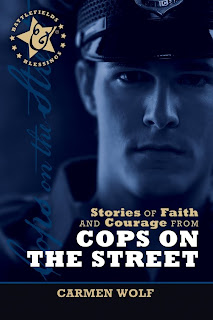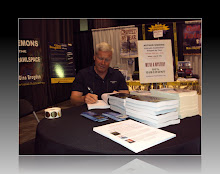
I sometimes have problems with the title of articles I write for publications. Should I capitalize each word in the title, or use lower case for prepositions only? The answer can be found in today's posting at: Daily Writing Tips.

 For more than a year now I have been writing book reviews for the NYJB. They are seeking more reviewers. If you are interested please read the information below.
For more than a year now I have been writing book reviews for the NYJB. They are seeking more reviewers. If you are interested please read the information below.NYJB has recently been profiled by Publishers Weekly because it is the one existing online review that has captured the attention of the publishing world. The New Yorker also recently cited NYJB. Our reviewers are both published authors and others able to write compelling reviews of books covering areas of their professional or equivalent expertise.
Currently 135+ reviewers.
Our reviewers have written:
500+ traditionally published books
500+ published short stories and poems
24+ plays
12+ screenplays/teleplays
20,000 articles (our reviewers with long careers add substantially to these numbers)
3,800 reviews of books (about 600 for New York Journal of Books)
Our reviewers are also winners of more than 75 literary and professional awards.
Visit us at nyjournalofbooks.com or nyjb.net to see the future of book reviewing. This should help you decide if you’d like to review or perhaps just introduce you to a highly professional online book review.
We are increasingly quoted, traffic to the site has grown dramatically, feedback is 100% positive, and we are swamped with requests for reviews. We generally publish reviews at 12:01 A.M. on date of release so that we are the first review of any new book we critique.
The Journal reviews both mainstream releases as well as many books in niche or non-mainstream genres and books by first-time authors than are infrequently covered by the current major review publications.
Our permanent website after months on beta is up. We are deep into the remaining administrative tech work that introduces new state-of–the-art function to the publishing world.
Reviewers all set their own pace for submitting reviews and are never asked to review books they prefer not to read.
We do not anticipate any material profit until we are able to focus singularly on commercializing, once the tech build is complete. And so, we are unable to pay reviewers for the reviews they contribute. However, we believe that most writers are underpaid for their work. It is our sincere hope and plan that the success of the New York Journal of Books will become a material source of supplementary income for all reviewers.
If interested in reviewing, please visit: http://www.nyjournalofbooks.com/reviewer-application or send the same info to:
reply@nyjournalofbooks.com
Only COMPLETE applications can be considered.
While you will be asked to note frequency of reviews, we understand that circumstances change and you will always set your own pace.
Thank you.
The editors of New York Journal of Books


It's the Christmas season, a time when our hearts gravitate toward people we cherish, and yes, even the pets we love. Some of our pets we've lost. If you had a pet that was like a member of the family (I did), why not share that love and write a short story? Authonomy, a division of HarperCollins, is sponsoring a short story competition. All you need to do is write a short story (up to 1500 words) about a loved pet or animal and send it off to authonomy@harpercollins.co.uk, with 'Christmas Competition' in the subject header.


• Do I have to own a Kindle to give or receive a Kindle book as a gift? No. Kindle books can be given and received by anyone with an e-mail address. Kindle books can be read either on Kindle or on your PC, Mac, iPhone, iPad, BlackBerry, or Android Phone using one our our free reading apps.
• What if the recipient doesn't like or want their gift? Kindle books received as gifts can be exchanged for Amazon.com gift cards.
• Are all Kindle books eligible to be given as gifts? All Kindle books available for purchase in the Amazon.com Kindle Store can be given as gifts.
Great gifts, reasonably priced!










Thrillers dominate with The Confession, the first fall legal thriller from John Grisham; Dead or Alive, the first book from Tom Clancy since 2003; Cross Fire and Don't Blink from James Patterson; and Port Mortuary by Patricia Cornwell. In horror look for Stephen King's Full Dark, No Stars and What the Night Knows by Dean Koontz.
A strong line-up of historical biographies by prominent authors will hit shelves including Decision Points by former President George W. Bush, Washington: A Life by Ron Chernow; and Extraordinary, Ordinary People by former U.S. Secretary of State Condoleezza Rice. Also expected to do well is America By Heart: Reflections on Family, Faith & Flag by Governor Sarah Palin, the follow-up to her bestselling memoir Going Rogue.
For readers of history and current affairs we are looking forward to Unbroken by Laura Hillenbrand, her first work since Seabiscuit, The Warmth of Other Suns by Isabel Wilkerson and Obama's War by Bob Woodward.






| Today's post is from: http://writeforyourlife.net/ Helpful information on giving and receiving critique. Critiquing etiquette: six ways to provide gracious feedback Receiving feedback is difficult. But giving feedback with grace is even more so. To grow and evolve as a writer you must offer your work to others for critique and editing. It’s one of those terrible truths you come to terms with, sooner or later. The thing about feedback though, it is reciprocal – like a rubber ball it will come bouncing back to you. Why? Quid pro quo. If you invite someone to invest time and effort in your work, at some point they will expect the same from you. While writers will begrudgingly accept the need for un-biased opinion, most writers feel incredibly uncomfortable being the one giving that opinion. It’s like taking the uncomfortable feeling of sharing your work and turning it up to 11. It’s not that you’re stingy, or don’t want to help. It’s to do with that feeling in your gut which warns you away from scary things. And let’s not beat around the bush – giving feedback is terrifying. What could possibly go wrong? What if you accidentally say something hurtful? Or you derail someone’s creativity or confidence with a misunderstood comment? What if they stop writing because of what you said? Or what you said was wrong! It’s much easier to play safe and say nothing. I can empathise. As an editor, and a writer, I have a foot in both camps, and I always find it far more difficult (and stressful) to provide rather than receive feedback. This is despite hangover sensitivities to critique after a bad experience as a young writer. Agreeing to provide feedback is one of the best things you can do to improve your writing skills. Plus, being asked implies the writer trusts you to help them take their story from good to fantastic. The good news is, you can provide feedback which is tough, gracious, thought-provoking and, dare I say, compassionate and constructive. Here’s a six-part guide to critiquing etiquette. 1. It is only one person’s opinion Always frame (and remember) your feedback is only your opinion – that’s all it is. And, it’s also just one person’s opinion. Others may have different thoughts or suggestions – including the author! I have a codicil at the bottom of my feedback emails which states: please accept/reject/alter or ignore anything here as it is your work and this is my take on it. 2. Dialogue between two people What people often forget about feedback is it’s a dialogue, not a monologue. Always offer to discuss your comments or suggestions with the writer. Remember though, it is not gracious and far from professional, to be defensive about your feedback. It’s OK if they disagree with you. It is the writer’s work after all and they do get the final say. Some of the most fulfilling editorial relationships I’ve had with writers have come about due to a lack of consensus. Disagreement opens the channels for discussion, and stories thrive in such hothouse environments. If possible have these conversations live. You can ask questions and get new insights into a story when a writer talks about it in real-time. 3. Stick to Specifics Useful feedback focuses on specifics. Always choose specific examples to illustrate your point/comment and give specific suggestions on how the writer may make changes. Be honest. Feedback, given constructively is more likely than you realise to give a writer an ‘a-ha!’ moment, even if it initially feels like a slap in the face. Useless feedback is broad-sweeping statements or generalisation. It slaps the writer in the face and that’s it. Steer clear of these at all costs. For one, it gives a writer nothing to work with. It is also gives ample fodder for a writer to fill in the details (and they’re never positive, these fillers). Most importantly, never critique or make comment on the author (this is why you should always stick to specifics). It is only, and will always only be about the work at hand. For example, I was told by a writer-in-resident when I was 18 that my writing was naïve and I should go and live in the real world. I filled in the gaps with shame, believing I’d had the audacity to think I could write. I didn’t show my work to another soul for almost a decade! 4. Be Positive Always, always, always lead off with something positive. Even the worst piece of writing has something good about it – it might be a brilliant idea which has been poorly executed on the page. Again – be specific! 5. Time is of the Essence Be mindful of the turn around. Don’t leave people hanging for weeks waiting. The general assumption is, if people don’t get back to you in good time the your work stinks and whoever you gave it to is struggling to find the right words to tell you that. Give yourself a deadline to return the feedback – or even better, get the writer to provide you with one. If you can’t in good faith provide feedback in that timeframe, don’t agree to take the piece. 6. Work from the brief Ask the writer for a brief. This will assist you in doing your job. In this they should tell you: § what kind of feedback they’re looking for § what draft version they are sending § where they are considering sending it (especially important if for a competition) § the word count § the due date for submission and the date feedback is required. Stick to the brief. If they’re asking for general comments don’t return a file with massive tracked changed edits. If the writer won’t or can’t provide you with a brief, don’t do the critique for them. Start small. Check your ego in at the door. Be truthful. Offer creative alternatives. And know, the more you provide feedback, the less excruciating it will become. Image: Christmas w/a K |


JW: Today my guest is Adele Brinkley, a professional editor who can edit anyone’s work ranging from letters to novels and short stories. Good morning, Adele!
Adele: Morning, John. Thank you for an opportunity to promote my editing service, With Pen In Hand.
JW: Tell us a little bit about your background and qualifications to be an editor.
Adele: I’ve been a professional editor for nine years and a high school English teacher for nearly 30. Editing comes as naturally to me as shouting Amen during a southern Baptist tent meeting. I truly try not to walk around with a red pen in my hand, but so far I have failed.
I want my clients’ works to be the best they can be. If they look good, then I look good. It’s a financial ego trip!
I’ve edited papers in all genres from practically every state in the Union. I actually have a couple of clients overseas, one in Sierra Leone.
Also for your Atlanta/Georgia area readers, please note that I am a local editor, located just south of Atlanta in the shadows of the Atlanta Motor Speedway.
Please go to my web page (www.WithPenInHand) to “meet” me and review my credentials.
JW: Do people most often employ you for manuscripts and query letters, or is there a broad range of services requested?
Adele: I do edit a broad range of materials, but manuscripts (fiction and non) and dissertations make up the majority of my work. What I have found with the latter is that doctoral candidates do know their material, but most of them do not know the fine points of grammar that APA requires.
I have edited some wonderful manuscripts. There are so many good writers out there who spin wonderful tales. They have not yet reached the level of Anne Rice, John Grisham, or Agatha Christie, but they produce some awesome books. I hope to see them one day on best seller lists.
I also have several clients who pay me a yearly fee to edit their business letters, journal entries, notes, or whatever they need.
JW: Since much of my network consists of writers of prose, short stories and novels, tell us about your fee and approximate length of time between submission and completion.
Adele: My fee is quite reasonable, especially compared to the fees of editors with major publishers or editing companies. I am strictly a freelancer. The cost for an initial novel of any length is $1.00 per double spaced page in 12 pt. font size and Times Roman font. Because I am not editing works of authors such as Rice or Grisham, I cannot charge exorbitant fees.
I had an author tell me one time that he regretted that he could not use my service because I didn’t charge enough. No problem, I’ll raise the price if people feel more comfortable with a higher fee. I wrote to him that he would get the same quality of editing for $1.00 a page that he would get if I charged him $15 a page. Several weeks later, he contacted me again, saying he had reconsidered. After checking out the “big guys,” I looked good to him!
JW: Adele, in editing novels or short stories, is there any one item that stands out as the most common mistake made by authors?
Adele: Verb tense, verb tense, and verb tense! After that come misplaced modifiers and/or dangling participles, word choices, repetition of words or phrases, and the usual culprits: subject-verb agreement, punctuation (especially with quotes and attributions), switching the POV, etc., etc, etc.
JW: During your career, have you had any published work(s) yourself?
Adele: No manuscripts. I can’t sustain a thought that long. I wrote for a newspaper for 15 years and had hundreds of stories and columns published, some of which were recognized and rewarded by the GA Press Association. The wire services even picked up several of them.
JW: What’s the best way to get in touch with you to discuss a proposal of any type?
Adele: On my web page at www.WithPenInHand.net , your readers will find a contact link. Click on it, and we’re in business!
JW: Thank you for an informative interview, Adele. I know my readers are always looking for reliable, professional people who can help them polish their work. It has been a pleasure.













